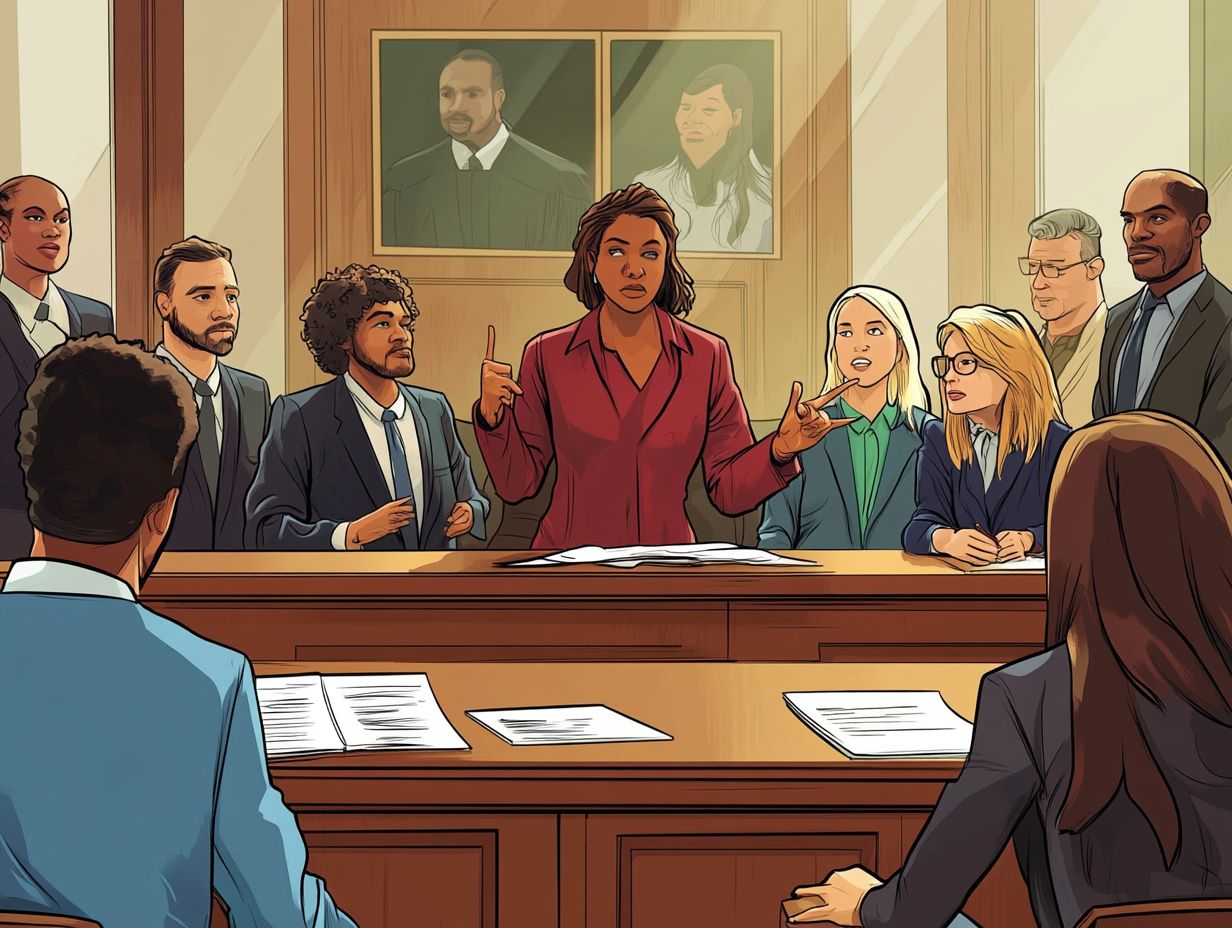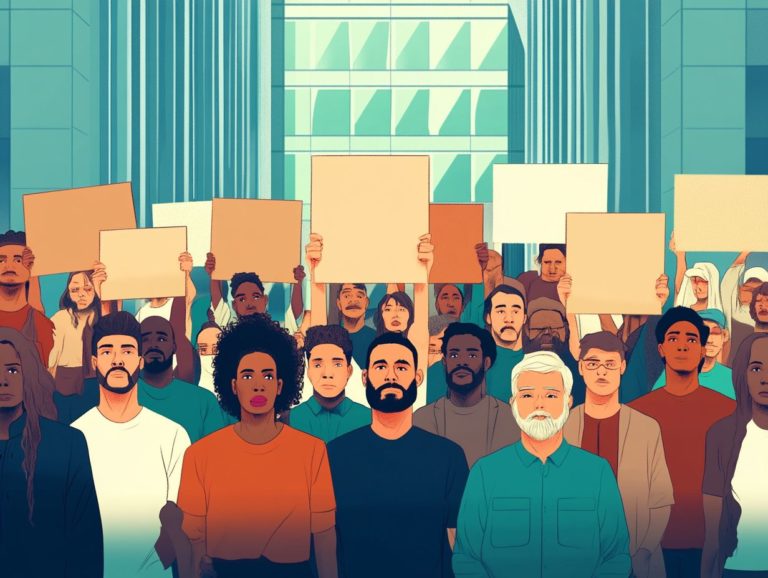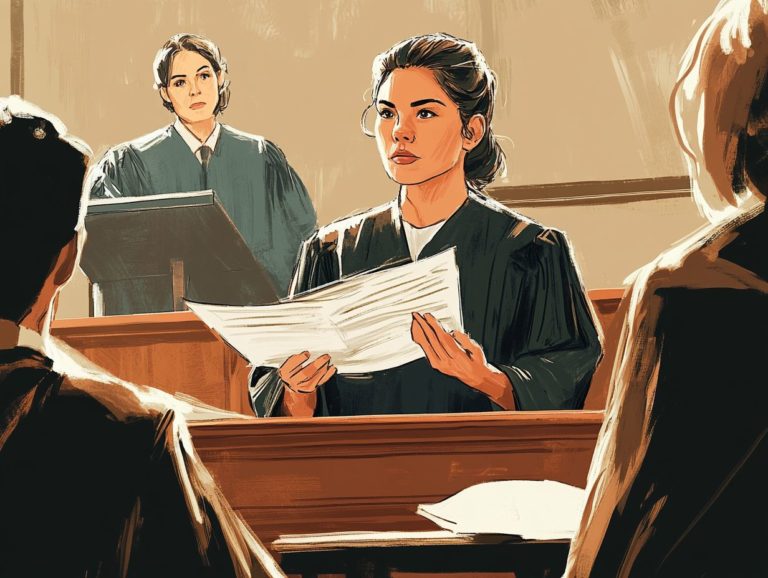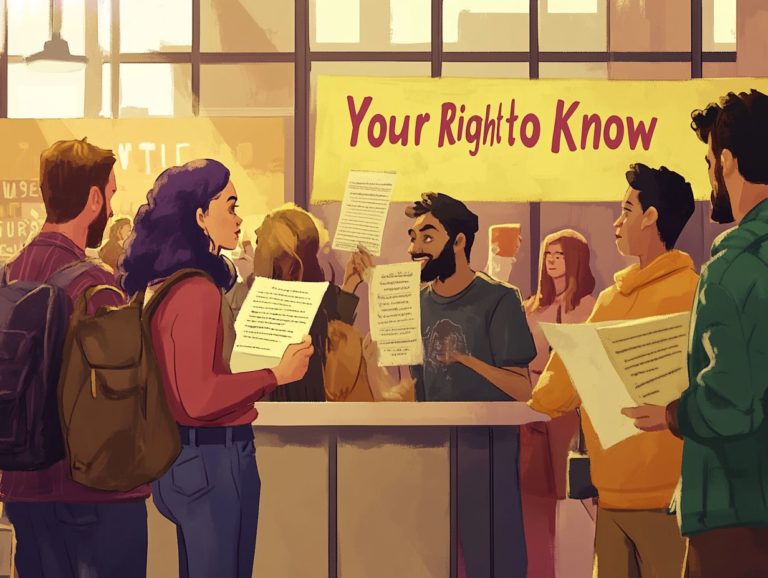Navigating the Legal System: Your Rights
Understanding your rights in the legal system is essential to securing justice. It also protects against discrimination, especially for marginalized communities.
The rights enshrined in the U.S. Constitution offer a vital framework for legal protections, ensuring that you have access to fair representation in court and that law enforcement follows established legal procedures.
A good understanding of these rights helps build social cohesion. It empowers you to navigate the complexities of the legal landscape with confidence.
This knowledge enables you to seek redress and support when confronted with violations or injustices in your community.
Contents
- Key Takeaways:
- Understanding Your Rights in the Legal System
- Types of Legal Rights
- Protecting Your Rights in the Legal System
- Common Legal Issues and Your Rights
- Frequently Asked Questions
- What does it mean to navigate the legal system?
- What are my rights when interacting with the legal system?
- How can I learn more about my legal rights?
- What can I do if I feel my rights have been violated by the legal system?
- How can I prepare myself for navigating the legal system?
- What are some common challenges when navigating the legal system?
Key Takeaways:

Understanding Your Rights in the Legal System
Legal rights include the protections and privileges given to you by various laws, ensuring that you receive justice and equitable treatment in society.
These rights serve as fundamental pillars, giving you the power while also establishing a framework for resolving disputes and safeguarding your freedoms.
By clearly defining what is legally acceptable and providing mechanisms for recourse, they play a vital role in maintaining order and fairness within your community.
The importance of having clear legal rights becomes especially apparent when it comes to promoting access to justice. It allows you to seek redress when wronged.
Various enforcement mechanisms, such as courts, legal aid organizations, and advocacy groups, actively work to uphold these rights. This ensures that you can effectively navigate the legal system and assert your entitlements without fear of discrimination or retribution.
Types of Legal Rights
Legal rights include a variety of categories, including civil rights, human rights, and constitutional rights. Each of these plays a crucial role in protecting individual freedoms and promoting fairness within society.
Understanding these distinctions can deepen your appreciation for the frameworks that uphold justice and equality.
Civil Rights
Civil rights include the protections and privileges that you are granted to ensure equality and prevent discrimination based on race, gender, or other characteristics.
These essential rights encompass various laws and protections, such as voting rights, which safeguard your ability to participate in democracy without facing oppression. Employment rights are equally vital, ensuring that you receive equitable treatment and opportunities in the workplace.
However, the journey toward achieving true equality is fraught with challenges, as systemic barriers and discriminatory practices continue to obstruct progress.
By understanding the significance of these civil rights, you empower yourself to advocate for change, ensuring that the struggles against injustice remain in the collective consciousness, ultimately paving the way for a more inclusive society.
Human Rights

Human rights are fundamental rights that belong to you and every individual. They provide essential protections and establish a foundation for justice and social cohesion within your community. These rights cover many important areas of life, including your right to freedom of expression, access to education, and protection from discrimination, resonating across different cultures and nations.
On a global scale, the acknowledgment of human rights signifies a commitment to honoring the dignity and respect owed to every person. This commitment shapes international laws and treaties that impact your world. In the United States, these principles are woven into the fabric of the Constitution and are regularly discussed and debated within legal frameworks.
Organizations like Amnesty International and Human Rights Watch play pivotal roles in monitoring abuses and advocating for those whose rights are under threat. They amplify voices that might otherwise go unheard. Their work not only illuminates violations but also encourages governments around the globe to uphold these critical principles, ultimately fostering a more just society for all.
Constitutional Rights
Constitutional rights are the fundamental freedoms embedded in the U.S. Constitution. They ensure that you receive fair legal representation and due process the legal requirement that the state must respect all legal rights owed to a person within judicial proceedings.
These rights form the backbone of the legal system, protecting against arbitrary governance and guaranteeing that everyone, regardless of their background or circumstances, has access to justice.
Take the Sixth Amendment, for example. It ensures your right to a public trial and the assistance of counsel essential elements for maintaining transparency and fairness in legal matters.
These protections are real and enforceable. They are upheld through a series of checks and balances within the judicial system, giving you the power to challenge any infringements and hold the state accountable for safeguarding these vital rights.
Protecting Your Rights in the Legal System
To effectively protect your rights within the legal system, it’s crucial to comprehend the established procedures and seek legal assistance when needed, especially regarding your rights in employment-related cases.
This approach ensures you receive fair representation and the enforcement of your rights, empowering you to navigate the complexities of the legal landscape with confidence.
Steps to Take When Your Rights are Violated
Act quickly if your rights are violated! Every moment counts in seeking justice. This may mean seeking legal representation to navigate the complexities of the law effectively.
Make sure to document every incident this evidence is your best ally in building a strong case. Reporting violations to the relevant authorities or organizations dedicated to advocating for rights is essential, as they often have established procedures to address such matters.
Engaging with community support resources can offer you emotional backing and guidance. This helps you understand your options and connect with others who have endured similar experiences.
This approach empowers you not only to respond but also to champion the rights of others, turning your experience into a catalyst for broader change.
Common Legal Issues and Your Rights
Grasping your rights in essential legal matters like employment, criminal justice, and family law is crucial for securing fair treatment and safeguarding your protections under the law.
Employment Rights

Employment rights serve as your shield against discrimination, ensuring that you receive fair treatment throughout the hiring process, in workplace conditions, and during termination.
These rights encompass a range of regulations aimed at creating a safe and equitable environment for all. You are entitled to protection against unfair treatment based on race, gender, age, or disability factors crucial for fostering workplace diversity and inclusion.
Comprehensive workplace safety regulations require your employer to maintain a hazard-free environment, safeguarding your well-being.
Furthermore, employee benefits such as health insurance, paid leave, and retirement plans are essential components of these rights, providing both personal and professional security.
By upholding these standards, you can confidently engage in your role, free from the fear of exploitation or unsafe conditions.
Criminal Justice Rights
Criminal justice rights are designed to ensure that you, as an individual accused of a crime, receive a fair trial and access to legal representation throughout the judicial process. These essential protections not only act as a shield against potential abuses of power but also play a pivotal role in maintaining your trust in the legal system.
Take, for example, the right to remain silent; this allows you to avoid self-incrimination. The right to an attorney ensures you have legal counsel at your side to navigate the complexities of the law.
Law enforcement officers are charged with upholding these rights, making certain that everyone regardless of the severity of the charges receives fair treatment. Their unwavering commitment to these principles is crucial for creating an environment where justice flourishes and the rights of the accused are honored.
Family Law Rights
Family law rights encompass a broad range of protections related to marriage, divorce, child custody, and domestic violence. These rights ensure you have the support and legal help you need to navigate these sensitive topics.
Knowing your rights is essential for your protection! If you are seeking protection from domestic violence, you can access measures like restraining orders, specifically designed to keep you safe from harm.
Legal aid is helpful in guiding you to understand your options in family law. It empowers you to make informed decisions about your family and future.
It s vital to recognize that you are not alone during these trying times. Numerous resources are available to assist you in asserting your rights.
Frequently Asked Questions
Navigating the legal system means understanding and using the laws and procedures that govern our society to protect your rights and interests.
What are my rights when interacting with the legal system?

As a citizen, you have the right to access legal resources, legal representation, and due process meaning the legal requirement that the state must respect all legal rights owed to a person. You also have the right to be treated fairly and without discrimination.
How can I learn more about my legal rights?
You can learn more about your legal rights by consulting a lawyer, reading legal resources, or seeking information from government agencies and non-profit organizations.
What can I do if I feel my rights have been violated by the legal system?
If you believe your rights have been violated by the legal system, you can file a complaint with the appropriate authorities or seek legal recourse through the court system.
To prepare yourself for navigating the legal system, it is important to educate yourself on the laws and procedures that may apply to your situation. Seeking the advice of a lawyer can be very helpful.
Some common challenges when navigating the legal system include understanding complex legal terminology, finding affordable legal representation, and facing delays and backlogs in the court system.






